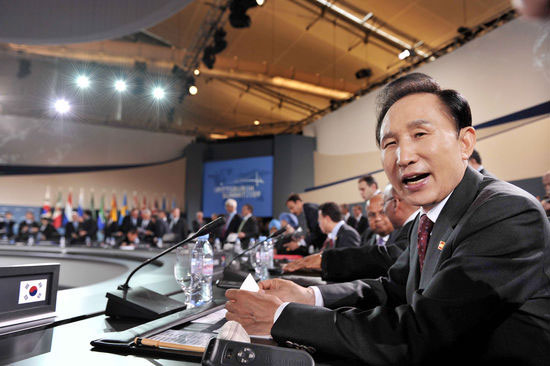 영어토론방 영어토론방 | Home>영어토론방 |
Diplomacy Terrorism in Korea
페이지 정보

본문

Vulnerable to Terrorism
Korea Is No Safe Zone From Unexpected Attacks
The recent arrest of a suspected Taliban leader here shows Korea might be dragged into the war with terror deeper than it thinks.
According to the police, the Pakistani imam (Muslim clergyman) has brainwashed and trained about 30 Uzbek students in Korea into Taliban agents as well as gathered intelligence about U.S. bases for nearly a decade. He went in and out of the nation as many as 17 times during the period, often with a forged passport using a ``laundered identity."
It's hard to understand how the police and immigration authorities have let the self-proclaimed Jihadist, who also is on the CIA's list of terrorism suspects, swagger about this country. A shiver ran through our limbs when thinking what would have happened had a religious rival not tipped police off.
This is also a chilling reminder that the Islamic militant groups, which have used Korea as a depot for trafficking drugs and other illegal items to raise funds, has begun to use the nation as a stage for cultivating ``autogenous'' rebel groups. Koreans, who have so far thought that Islamic terrorism is a story for Iraq, Afghanistan, Yemen and the United States, must be feeling the possibility is far greater ― and nearer to them.
Such chances grow even bigger, considering that Seoul is pushing to send 500 civilian reconstruction experts and their military convoys to Afghanistan in July, and is scheduled to host the G-20 summit in November.
We are not certain whether Islamic fundamentalists would target the leaders of the world's 20 biggest economies, which include some Muslim countries, at the meeting, thus turning the entire globe against themselves. When it comes to hitting Korean targets alone, however, the probability sharply increases, especially because the Taliban has threatened more than a few times to retaliate against Korea's re-dispatch of troops, which it withdrew from Afghanistan 26 months ago.
All this requires the Lee Myung-bak administration to review its policy not just on counterterrorism but on joining the U.S. war on terror from the ground up.
Most urgent of course will be measures to step up anti-terrorism efforts, such as sharing related intelligence with allies, tightening immigration procedures and enhancing surveillance on the possible existence of Islamic extremists, especially at a time when the number of foreign residents has topped 1 million. What makes the authorities' work harder still is that they must take extra care not to aggravate the nation's already notorious treatment of foreign visitors from Asian neighbors.
A more fundamental approach, however, is for the Lee administration to create ― or improve ― an environment to reduce concerns about terrorism by opening up the debate on the troop re-dispatch not just to politicians but to the general public, who could be the direct victims of any governmental decision.
We would like to accept the officials' explanation that sending the provincial reconstruction team to the Middle East is to benefit the Afghan people, and not the U.S.'s and Korea's strategic interests. Even if the latter is closer to the truth, the government should explain it to the people and seek their cooperation.
People deserve to know why they should make sacrifices before being forced to do so, instead of continuing to play the roles of blind proponents and equally blind opponents.
Excerpts from The Korea Times
http://www.koreatimes.co.kr/www/news/opinon/2010/02/202_61218.html
Police Preparing for Terrorists Ahead of G-20
By Kang Shin-who
Staff Reporter
Police have set up five squads in a special task force to deal with crimes committed by foreigners, potentially including terrorists ahead of the G-20 summit scheduled for November in Seoul.
Seoul Metropolitan Police Agency said they had been short on manpower to efficiently deal with international crimes during the G-20 summit, and crimes committed by foreign residents here.
The international event will invite leaders from the world's 20 major economies to discuss various economic and financial issues.
The five teams will cover northwestern Seoul including Yongsan and Itaewon; the northeast; the south; the southeast including Gangnam; and the southwest.
They will have a total of 109 policemen, up from 31 and will deal with foreign gangsters and illegal trafficking of drugs and weapons.
Meanwhile, 150 cases of narcotic smuggling amounting to 42 kilograms were discovered last year, according to the Korea Customs Service.
The amount is similar to that of the previous year when 42.4 kilograms were confiscated. By nation, South Africa was the largest drug originator with 23 kilograms, followed by China with 8 kilograms.
More than 80 percent or 34 kilograms were brought in by airplane passengers, with 4.7 kilograms sent via international mail and 2 kilograms of drugs attempted to be brought in by boat, the customs agency said.
Korea is by and large free from major terror attacks but some experts believe that the G-20 summit can invite anti-globalization members to Seoul, if not terrorists. Considering Korea's planned troop dispatch to Afghanistan, it may draw in some Islamic terrorists.
As for weapons, news reports say Korea is vulnerable to terrorists concealing plastic and ceramic knives, because they are not detected by immigration authorities.
However, they have blades over 18 centimeters and can inflict fatal injuries. They can penetrate multilayered plywood and easily puncture a can as seen in footage posted on You Tube.
According to police, about 10 types of U.S.-made concealed weapons are being traded over the Internet.
Excerpts from The Korea Times
http://www.koreatimes.co.kr/www/news/nation/2010/02/117_60507.html
Question
1. Tell us what you know about terrorism. ( news, experience... anything is okay )
Are you afraid of terror attack in Korea?
2. Assess Korean's anti-terrorism efforts compared to other countries(including the efforts for G-20 summit).
Based on your assessment, what needs to be done additionally?
3. Which do you think is more effective to reduce the terror attack: negotiation with terrorists vs military activities
이 글은「대학연합영어토론동아리」www.pioneerclub.com에서 제공하는 영어토론 정보입니다.
댓글목록
등록된 댓글이 없습니다.

